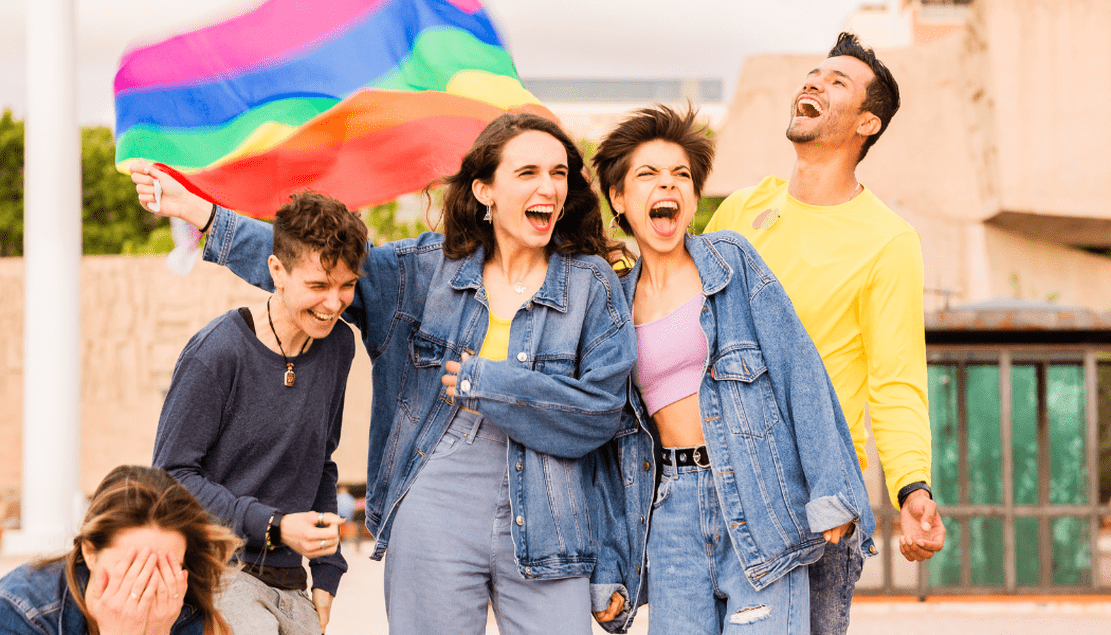Coming to terms with one’s identity can be a difficult, yet transformative experience. For individuals who identify as LGBTQ+, this journey can involve unique challenges related to societal norms, self-acceptance, and external pressures. Ultimately, embracing your true self is key to living an authentic life filled with self-love, pride, and purpose.
1. What It Means to Identify as LGBTQ+
To fully embrace your identity, it’s crucial to understand what it means to be part of the LGBTQ+ community. LGBTQ+ is an umbrella term that represents a broad range of sexual orientations and gender identities. Here’s a quick breakdown of what the acronym stands for:
- L stands for Lesbian: A woman who is emotionally, romantically, or sexually attracted to other women.
- G stands for Gay: A man who is emotionally, romantically, or sexually attracted to other men. Additionally, the term can also be used for women who love women.
- B stands for Bisexual: A person attracted to more than one gender.
- T stands for Transgender: Someone whose gender identity does not align with the sex assigned at birth.
- Q stands for Queer or Questioning: Queer is an inclusive term for people who don’t fit into societal labels for gender or sexuality. Meanwhile, questioning refers to individuals exploring their sexual orientation or gender identity.
The “+” in LGBTQ+ represents other identities such as pansexual, intersex, asexual, and non-binary individuals, among others.While each identity holds its unique experiences, collectively, the LGBTQ+ community shares a commitment to embracing diversity and advocating for acceptance.
For many, identifying as LGBTQ+ involves a personal journey of self-discovery, often marked by questions like, “Am I the only one who feels this way?” or “What does this mean for my future relationships?” Thus, the process of accepting your identity begins with self-compassion, understanding that your feelings are valid, and rejecting the notion that you must fit into a conventional mold to be accepted.
Understanding your identity also connects you to the broader LGBTQ+ movement, which advocates for equal rights, representation, and visibility. Pride events, symbols like the LGBTQ flags, and historical milestones are important aspects of celebrating diversity in the community.Therefore, familiarizing yourself with LGBTQ+ history and symbols (such as the rainbow flag) can help you feel connected to a rich legacy of resilience, activism, and pride.
2. Breaking Gender Norms: Culture and LGBTQ+ Acceptance
Cultural norms often enforce rigid expectations about gender and sexuality. Consequently, for LGBTQ+ individuals, breaking free from these norms can be both liberating and intimidating. Although societal expectations might push you towards conforming to traditional gender roles, these roles can be limiting and restrictive.
Gender norms dictate how people should dress, behave, and engage with the world based on their assigned gender.Therefore, when someone doesn’t fit into these boxes, they may feel pressured to suppress their identity.
Ultimately, breaking gender norms isn’t just about how you present yourself physically; it’s about challenging the societal rules that dictate what’s “appropriate” for someone based on their gender. This could involve something as simple as wearing clothes that align with your gender identity, using different pronouns, or advocating for inclusivity in your community or workplace.
3. Positive Relationship with Your Body and Appearance
Developing a healthy relationship with your body and appearance is essential, especially for LGBTQ+ individuals who may face additional pressure to conform to unrealistic beauty standards. In fact, these pressures can come from both the LGBTQ+ community and society at large. Body image struggles are not uncommon among gay men, transgender individuals, or others in the LGBTQ+ community who feel they need to look a certain way to “fit in” or be accepted.
It’s important to understand that your body is valid, regardless of how it compares to societal ideals. For instance, if you are transgender or non-binary, you may feel dysphoria or discomfort with your body not aligning with your gender identity. Seeking gender-affirming care, such as hormone therapy or surgery, might be part of your journey toward a more positive relationship with your body.
However, body positivity goes beyond appearance. It’s about accepting and loving your body for what it is and the unique ways it allows you to express yourself.
4. Mental Health and Self-Care in Your LGBTQ+ Journey
Mental health is a significant aspect of accepting your LGBTQ+ identity. The journey of self-acceptance is often challenging, as it can involve feelings of isolation, rejection, or internalized shame. Notably, LGBTQ+ individuals are statistically more likely to experience anxiety, depression, and other mental health issues due to the discrimination and marginalization they may face.
Self-care is vital in maintaining mental well-being. This involves setting boundaries, seeking therapy when needed, and taking time to recharge emotionally and physically. Engaging in activities that bring joy and practicing mindfulness can help alleviate stress. Additionally, it’s important to surround yourself with people who support your journey and validate your experiences.
Furthermore, therapy, especially LGBTQ+ affirming therapy, can be incredibly beneficial for working through emotional challenges. Speaking to someone who understands your identity without judgment can provide a safe space to process feelings and build resilience.
5. Finding Meaningful Connections
One of the most rewarding aspects of embracing your true self as an LGBTQ+ individual is finding meaningful connections with others who share similar experiences. The LGBTQ+ community provides a sense of belonging, offering spaces where people can be their authentic selves without fear of rejection or prejudice.
Building connections can happen in various ways—whether through local LGBTQ+ organizations, online communities, or social groups that center around shared interests. These spaces allow individuals to exchange stories, support one another, and work together to advocate for LGBTQ+ rights.
Moreover, being part of a supportive network also helps counteract feelings of loneliness and isolation, which are common among individuals who feel marginalized or misunderstood. Whether it’s through a local support group, attending Pride events, or finding friends online, the LGBTQ+ community is a resource for solidarity, love, and understanding.
6. Fear and Embracing Vulnerability
Finally, fear is a natural part of the LGBTQ+ experience, particularly when it comes to embracing vulnerability. Many LGBTQ+ individuals grow up fearing rejection from their families, friends, or society. This fear can lead to hiding one’s true self or experiencing anxiety about coming out.
However, embracing vulnerability is an essential part of self-acceptance. It means opening yourself up to being seen fully, even when it feels risky. Vulnerability allows for deep and meaningful relationships, as it fosters honesty and authenticity. It also gives others the opportunity to understand and accept you for who you truly are.
Conclusion
Accepting your LGBTQ+ identity is a journey filled with personal growth, challenges, and ultimately, empowerment. By understanding what it means to identify as LGBTQ+, breaking gender norms, cultivating body positivity, prioritizing mental health, finding meaningful connections, and embracing vulnerability, you can walk the path toward embracing your true self.
The LGBTQ+ community stands as a powerful source of support and pride. It teaches us that while the journey to self-acceptance may be difficult, it is worth every step. Therefore, by being true to who you are, you not only enrich your own life but contribute to creating a world where love, diversity, and acceptance prevail.
AT THE KARAN
At The Karan, we are dedicated to supporting your journey to self-acceptance and empowerment. We understand the significance of acceptance in both family and love relationships. Our focus is on helping you embrace your true self by addressing emotional challenges and past traumas.
Through positivity and distant healing techniques—such as crystals, attunement, and visualization—we nurture self-love and acceptance.
Start your journey to embracing your true self and LGBTQ+ identity with The Karan’s expert guidance, paving the way to a brighter future.
Book Your Session Now!












